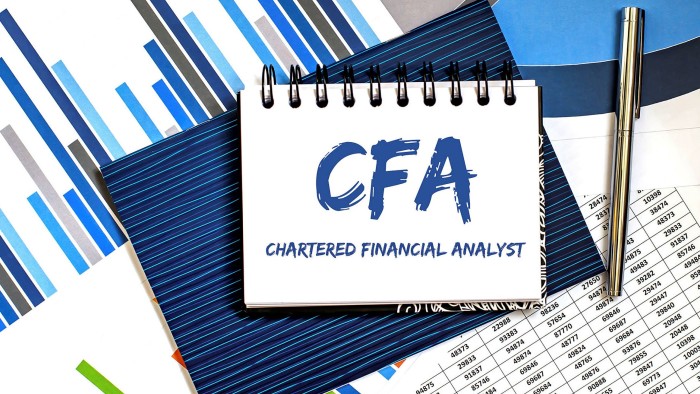CFA under fire over job cuts and exam delays

Roula Khalaf, Editor of the FT, selects her favourite stories in this weekly newsletter.
CFA Institute, the organisation that oversees the popular tests to become a chartered financial analyst, has come under fire from both staff and students after it culled about a fifth of its workforce and delayed examinations around the world.
The Virginia-based group, whose members are widespread across the investment, banking and wider financial sectors, is in the process of laying off about 120 people globally.
CFA said the redundancies followed the introduction of a new operating model to “modernise the organisation”.
“We recognised that we would need new skills and competencies, as well as implementing computer-based testing, creating new learning and education opportunities,” said Margaret Franklin, president and chief executive of CFA. “This resulted in the need to eliminate a number of roles.”
But the cuts have incensed some CFA employees, sparking concerns about heavier workloads and frustration that the restructuring programme was happening at the same time as the pandemic, which left it unable to run exams as planned.
The exams, which have been dubbed among the hardest in the world, normally take place just twice a year. Thousands of students traditionally sat the exams on the same day in test centres globally using pen and paper.
“The feeling [among staff] was that the focus should have been on the exams and getting those happening,” said one employee, who added the workforce was “demoralised”.
“There is huge disruption,” the employee said. “People are feeling they are not being heard, that they are pawns in a game. It is just making us all feel like why do we bother.”
There are also concerns that despite generous redundancy packages, employees are being laid off at a time when the global economy is in flux, meaning they could struggle to find work. Big asset managers have warned companies to look after their workforces through the pandemic.
Franklin said affected employees would receive full pay and benefits until August “at which point our severance packages commence, reflecting the extraordinary context of the pandemic”.
She added that CFA was continuing to “communicate, survey and listen to our staff” as the new strategy was rolled out. She said new roles were also being created.
Franklin also pushed back against criticism of the organisation’s handling of exam delays, after tests were postponed because of lockdowns.
One candidate, as people who are sitting the exams are known, told the Financial Times that he was “so frustrated” by his experience with CFA. He criticised the organisation for not announcing delays to exams sooner and for not offering all affected candidates a refund.
“Candidates, thoroughly passionate about being in the finance industry, invest hundreds of hours of time and energy into this exam, and are yet treated unfairly by those administering the exam,” said Raajan, who asked not to be identified further.
His comments were reiterated on numerous posts on Reddit, the social media platform. One post said CFA “doesn’t care about us”, while another accused it of a “failure to protect exam sitters’ mental health”, and questioned why it did not move faster to online exams.
CFA said it had been in regular contact with its candidates throughout the pandemic. It said there were significant complexities, including technological and security-related, that came with administering the exams, but added that its teams were working at an “accelerated pace to address them”.
It introduced computer-based testing for exams taking place from February. It will also run its exams on more days this year than normal.
Franklin said: “Our first-ever computer-based testing went ahead in the vast majority of locations [in February], and 28,000 candidates went ahead as planned. In fact, only 600 candidates [in February] had their exams cancelled.”
Comments